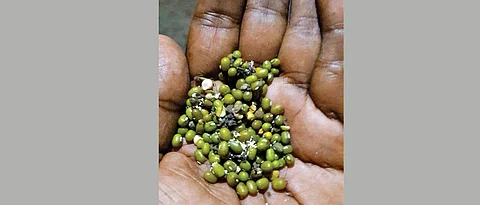

Pune: Farmers, who took the moong and urad crops expecting a Kharif yield, are under severe distress as the produce that has been lying unsold at their homes without a proper storage system, has started rotting.
The traders of the majority of the Agriculture Produce Market Committees (APMC) in the State had gone on a strike in the month of August this year, disrupting the bidding and auctioning of agricultural produce in the APMCs.
The State government was overlooking a proposed amendment to the Agriculture Produce Market (Regulation) Act of 1967, which would make it possible to prosecute a trader, who does not comply with the declared Minimum Support Price (MSP) and pays the farmer below the MSP. The traders could be fined up to Rs 50,000 and imprisoned for up to 1 year on failing to pay the MSP under the provision.
Angry traders had declared an indefinite strike and had stopped all purchase, sale, bid and auctioning processes at the APMCs across the State.
The season thankfully had no major crops coming to harvest and farmers were handling sowing. But farmers, especially in the Marathwada and Khandesh regions, had sowed pulses like urad and moong in an attempt to take advantage of the early rain showers in June. But traders, especially in these regions, had continued the strike even after the trader’s associations had taken back the strike on September 3.
This has disrupted the two crops. Ashok Pawar, a farmer from Omerga in Osmanabad district, said that he had sowed in June itself. “As there were some heavy early showers, I had sown urad on 6 acres of my land and moong on 3 acres. The crop was expected to have a yield of 4 kg per 1,000 sqft, but it fell down to 1.5 kg because the rains took a gap in between,” he said.
“While we were trying to manage these losses, the strike happened. We had to keep our produce, which was harvested in early August, in our homes as there is no storage facility
available,” he added.
“As we waited, other farmers too began to worry. Another farmer, Sudhakar Patil, had sown ‘urad’ on almost 7 acres of field. Our harvested produce was left unsold for almost 35-40 days. The government created the confusion and the scared traders stopped the trading,” Pawar said.
“Now the produce is developing a rot, which eats up the nutritious middle part of the lentils. This makes the crop useless for lentil (dal) making and we don’t know whom to blame for this loss and how to recover from it,” Pawar added.
Ashok Chavan, a trading agent at a local APMC in Osmanabad, said that he has seen a drop in the produce sold this year. “I handle and sell almost 500 quintals of moong and urad during the season. There was an expectation of a good season this year too, but since the strike and the spread of rot, the sales have almost halved and the markets are still coming back from the disruption,” Chavan said.
“The only way to salvage the losses of farmers is maybe if the seed companies buy the rotten crops as it still has the germination capacity,” he added.
